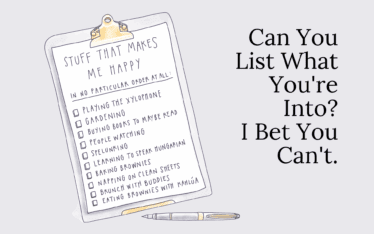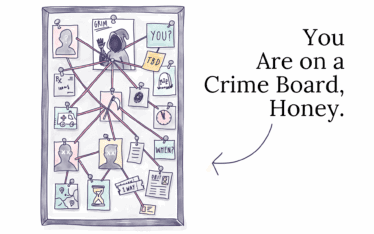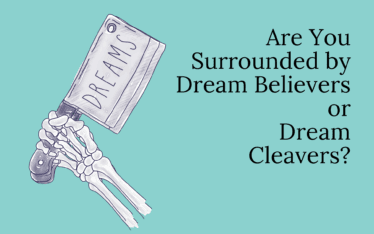My friend Bill (who hilariously calls himself a “free range chicken” after pseudo-retiring a few years ago) recently confided he’s feeling less curious these days. This was bothering him, and I get why.
My curiosity has gotten crusty around the edges, too, because I’ve been living a smaller life within our Plague-riddled world. For a girl who has curiosity as a signature character strength (which The Husband affectionately refers to as incessant nosiness), feeling a diminishment of curiosity is like losing my mojo. Many of my clients admit feeling less interested in exploring new things, too (even though they desperately want new thing to happen to them). So I got curious about curiosity (ha! Curiosity2) and plunged into the science. What’s the connection between curiosity and life satisfaction? Read on, Curious George. It’s worth finding out.
Just to be clear, curiosity is…
Curiosity is that feeling we get when we bump up against something new. It’s that positive emotional-motivational phenomenon that zeroes us in on novel opportunities… it’s that desire to know why, when, who, where, and how… about any kind of what.
Curiosity has the potential to spark a wildfire of interest within us. It also keeps us anchored in the moment, which most of us are tremendously horrible at. In his book, Curious?: Discover the Missing Ingredient to a Fulfilling Life, Todd B. Kashdan has these compelling words to say about our subject at hand:
“Only in the present can we be deliberated to do whatever it is we want. It’s a razor thin moment when we are truly free. When we are curious, we exploit these moments by being there, sensitive to what is happening regardless of how it diverges from what it looked like before past where what we are expecting it to be future. We are engaged and alive to what is occurring. We are energized. We are open and receptive to finding opportunities, making discoveries, and adding to the meaning in our life.”
What do the scientists have to say about curiosity?
Researchers are clear: the more willing we are to adopt a curious, novelty-seeking mindset, the likelier we are to flourish and thrive. Studies consistently show that variety can reduce the risk of hedonic adaptation (you know — that shitty thing that happens when we come down from the gleeful high of positive events and consistently return to our baseline levels of happiness). Exposing ourselves to new things and indulging in them (a.k.a. letting curiosity reign) prevents the ho-humness of life from zapping our aliveness.
Studies also show that people who are more curious tend to confront and reassess their views of themselves and the world, pushing the limits of what they know to be true by acquiring new perspectives and knowledge along the way. This in turn leads to the creation of more meaning and fulfillment in life. You read it right: being curious builds meaning.
One of the truisms I’ve come to love is that well-being is a process, not merely an outcome. The lives we yearn for aren’t out there at some kind of finish line, they’re happening right now in-between one mundane moment and the next. We need to wake up and actively make our lives enjoyable on an daily (often hourly) basis. Getting curious can help us make the mundane amusing — like buying strange new foods while at the grocery store (guys: we tried this ancient African grain called fonio and love it… and on their website they say, “Fonio never embarrasses the cook. Unlike rice, fonio is forgiving” … so I’m a fan for life.) Getting even more curious can pluck us out of the mundane and drop us right into the land of adventure — like embarking on a road trip to see the Four Corners Monument (the only place in the US where you can be in four states at once: Arizona, New Mexico, Utah, and Colorado), or traveling to Naples to take a Neapolitan pizza-making class.
Curiosity urges us to discover, get adventurous, and grow. Researchers have caught onto the notion of ‘exploration and absorption’ as a means towards well-being: Exploration comes from pursuing the details that spark our interest, which can be anything novel (like visiting the Museum of Ice Cream opening in Chicago this summer, which “is designed to be a culturally inclusive environment and community, inspiring human connection and imagination through the universal power of ice cream.” HELL YES. TWO SCOOPS OF THAT FOR ME!), challenging (like learning how to play the bassoon), or fascinating (like researching the mating habits of sea slugs, which I’ve spent an embarrassing amount of time looking into for no real reason at all).
Absorption comes from being fully engaged with an activity, like if those bassoon lessons sweep you off your feet and put you in that revered state of flow. This exploration-absorption dance is what adds to our subjective sense of life satisfaction.
We can become curious about people (including ourselves), places, and things. Researchers in Liverpool, UK connected the dots between curiosity, place, and well-being as a result of a public health initiative that encouraged residents to “take notice” of events and goings-ons in their community. I love this phrase, take notice. Are you actively taking notice of what’s going on around you? Are you taking notice of the new highrise being built, floor by floor? What’s growing at the community garden? What games are being played at the park? What’s on the menu at the new pub on the corner? The simple act of taking notice leads to greater well-being.
Take the curiosity assessment.
Find out how curious you are (or aren’t). These questions are from the Curiosity and Exploration Inventory-II, and you can assign yourself a number ranging from 1 to 5 for each item.
1=Very Slightly or Not at All‚ 2= A Little‚ 3= Moderately‚ 4= Quite a Bit‚ 5= Extremely
- I actively seek as much information as I can in new situations.
- I am the type of person who really enjoys the uncertainty of everyday life.
- I am at my best when doing something that is complex or challenging.
- Everywhere I go, I am out looking for new things or experiences.
- I view challenging situations as an opportunity to grow and learn.
- I like to do things that are a little frightening.
- I am always looking for experiences that challenge how I think about myself and the world.
- I prefer jobs that are excitingly unpredictable.
- I frequently seek out opportunities to challenge myself and grow as a person.
- I am the kind of person who embraces unfamiliar people, events, and places.
The concept of Stretching (covered in items 1‚ 3‚ 5‚ 7‚ and 9) indicates how motivated you are to pursue new information and experiences. The concept of Embracing (covered in items 2‚ 4‚ 6‚ 8‚ and 10) relates to your openness to the novel, uncertain, ambiguous aspects of life.
Where might you need to work on stretching or embracing?
Did one of the questions jar you, or poke you a bit with a stick? That might be worth paying the most attention to.
Curiosity-boosting ideas (many of which are cheezy, but work with me here, guys):
- Make a list of things that interest you, then set about to learn more about them. Look up MOOCs, articles, podcasts, interviews, whatever it takes to feel more knowledgeable about your subjects of interest.
- Design your own curriculum, if you’re super motivated to get curious and learn. Pick one topic per month to delve into and create summary notes/ slides to capture your learnings. Maybe pair up with an equally geeky friend and present your findings to one another each month? (I say “geeky” as a compliment.)
- “Take notice” around your community. Imagine it’s your first time in your neighborhood and see your environment through fresh eyes. Find something new the corner store, your backyard, your street, the trees in the park, etc. What have you been taking for granted or overlooking?
- Take a different route when driving to work/ dropping the kids off at school/ taking your evening walk/ running your 5k.
- Become a non-dangerous peeping Tom. Walk through your neighborhood at night and look into store and house windows, noticing the layout of merchandise or decor. (I sometimes walk so slowly by a beautiful home I want to see into at night, admiring the bookcases and crown moulding, that I run the risk of appearing sketchy. There’s a fine line between curiosity and stalking, friends.)
- Book an experience into the future — like a trip to a new city, or reservations for a different restaurant — and research what you will do or eat ahead of time. What’s the history of the location you’re visiting, and what’s their star attraction? Where’s the best place to eat fried chicken there? For the restaurant, what’s the story behind the chef and why did they name the restaurant the name they gave it?
- Ask great questions. Terry Gross (NPR host extraordinaire) once said the secret to being a good conversationalist is curiosity, so the next time you meet someone new, ask them a question, then ask a follow up question about what they said, then ask another question about what they said next (without being horribly annoying).
- Check out this list for more ways to boost curiosity (in addition to the other 23 character strengths).
Positive psychology researchers have said their “research suggests that curiosity is an important, neglected process in the pursuit of a life well lived.” Join me on this Curiosity Crusade! Entertain your desires to know or learn things. Let’s get inquisitive. Let’s get incessantly nosy. Let’s absorb all the information we can — that’s what widens and deepens our lives, after all. And please reach out and tell me what you’ve done to become more curious… you’ve gotta satiate my own need to know. 🙂







